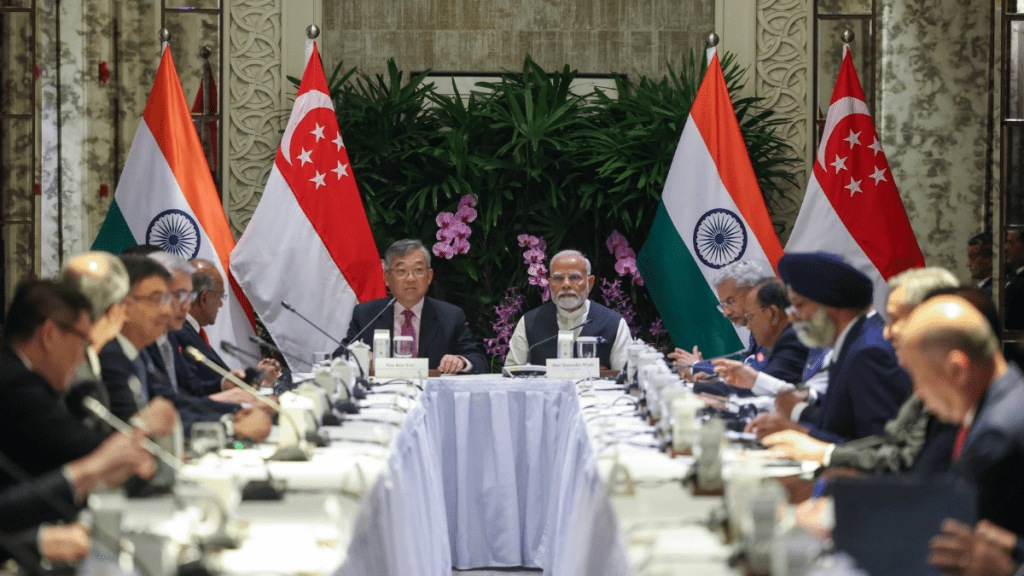In a groundbreaking diplomatic advance, India and Singapore have elevated their bilateral relationship to a Comprehensive Strategic Partnership, marking a new era of cooperation between the two nations. This significant development was announced during Indian Prime Minister Narendra Modi’s high-profile visit to Singapore, where he met with Singaporean Prime Minister Lawrence Wong. The visit underscored a deepening partnership and set the stage for ambitious new collaborations.
Celebrating Leadership and Progress
Addressing Prime Minister Wong, Modi remarked, “This is our first meeting since you assumed the office as Prime Minister. My heartiest congratulations and best wishes to you. I am confident that under the leadership of 4G, Singapore will achieve progress even more rapidly.” Wong, who took office in May, succeeds Lee Hsien Loong and represents the fourth generation of the People’s Action Party (PAP) leadership. His appointment signifies a new chapter for Singapore as it continues to drive economic and social advancement.
Modi’s visit to Singapore followed his landmark trip to Brunei, which marked the first bilateral visit by an Indian Prime Minister to the Southeast Asian nation. Modi highlighted Singapore’s role not only as a partner but as an inspirational model for developing countries. “We also aim to create multiple ‘Singapore’ within India. I am pleased that we are collaborating towards this goal,” he stated. This sentiment reflects a broader ambition to replicate Singapore’s success in various sectors within India.
Unveiling Key Agreements and Initiatives
The visit was marked by the signing of several Memoranda of Understanding (MOUs) aimed at deepening bilateral cooperation. Key agreements were made in the fields of semiconductors, digital technologies, education, and healthcare.
Semiconductors: One of the most notable agreements was the MOU on semiconductor cooperation. This deal is set to strengthen the semiconductor supply chains of both countries, leveraging their respective strengths in the industry. Singapore Deputy Prime Minister Gan Kim Yong described the MOU as a commitment to addressing global semiconductor demand and enhancing supply chain resilience. He stated, “This MOU signals India’s and Singapore’s commitment to work together in the field of semiconductors to address the demand from industries around the world. This will also strengthen semiconductor supply chain resilience and create new markets and opportunities for businesses in our countries
Digital Technologies: Another significant MOU focuses on digital technologies, aiming to bolster cooperation in cybersecurity, data flows, and digital infrastructure. This agreement will encourage greater interoperability between Singapore’s and India’s digital economies. Singapore’s Minister for Digital Development and Information, Josephine Teo, emphasized the importance of this agreement in enhancing business-to-business linkages and sharing technical expertise.
Education and Skills Development: The MOU on education and skills development will promote collaborations between higher education institutes, facilitate teacher training, and support student internships. This agreement reflects ongoing efforts to enhance technical and vocational education in both countries.
Healthcare: In the field of healthcare, the MOU aims to improve cooperation in disease surveillance, medical research, and health resource development. This agreement underscores a mutual commitment to advancing health standards and preparing for future pandemics.
Looking to the Future
The partnership also includes plans to celebrate the 60th anniversary of India-Singapore relations in 2025. Modi announced the upcoming inauguration of India’s first Thiruvalluvar Cultural Centre in Singapore, honouring the Tamil saint Thiruvalluvar. “His work, the Thirukkural, was composed nearly 2,000 years ago, yet its ideas remain relevant even today,” Modi remarked.
Additionally, both leaders highlighted ongoing efforts to promote regional peace and stability, with a focus on advancing shared democratic values and mutual interests. Discussions also covered the roles India and Singapore, along with ASEAN, can play in shaping an “Asian century.”
A Vision for Regional Collaboration
Modi’s visit emphasized the strategic dimensions of the India-Singapore relationship. The leaders expressed a shared vision for regional security and economic development, reinforcing their commitment to working together on both bilateral and global fronts. Jaideep Mazumdar, Secretary (East) in India’s Ministry of External Affairs, noted the importance of their “multi-dimensional partnership” and the need for both nations to continue developing this synergy.
Meeting Business Leaders
Prime Minister Modi met with business leaders and CEOs of Singapore and highlighted the reforms underway in India that will encourage investment and innovation.
PM Modi also said that he discussed ways to enhance economic relations between the two nations.
Sharing a post on X, he wrote, “Interacted with top business leaders and CEOs in Singapore. We talked about ways to deepen economic linkages. I highlighted the reforms underway in India, which will encourage investment and innovation.”
Later in the day, PM met Goh Chok Tong, Emeritus Senior Minister of Singapore and former Prime Minister of Singapore.

